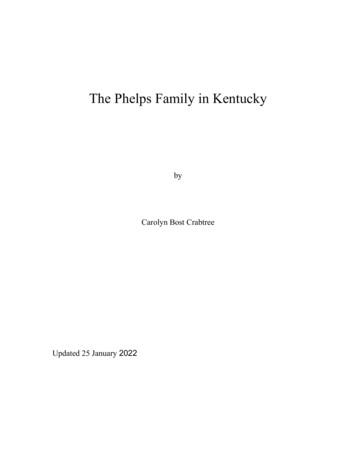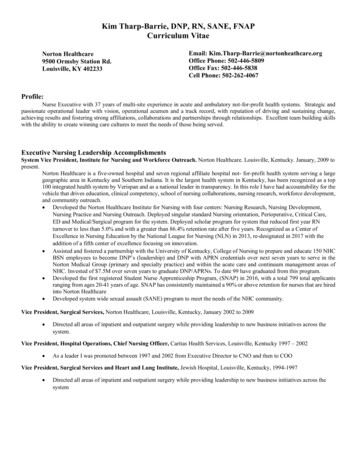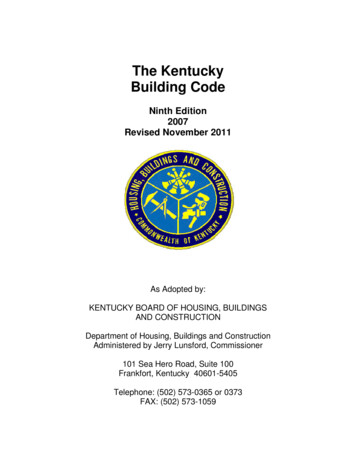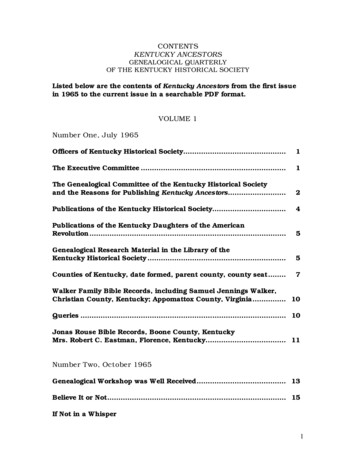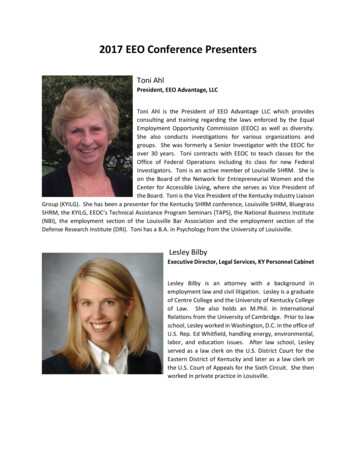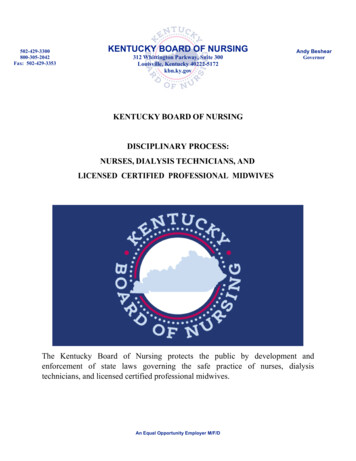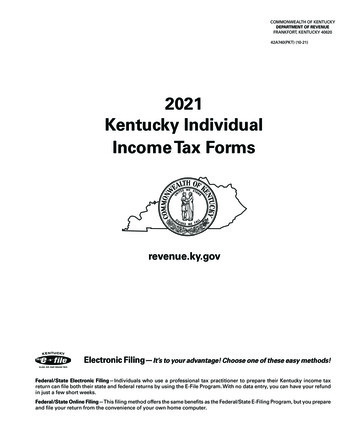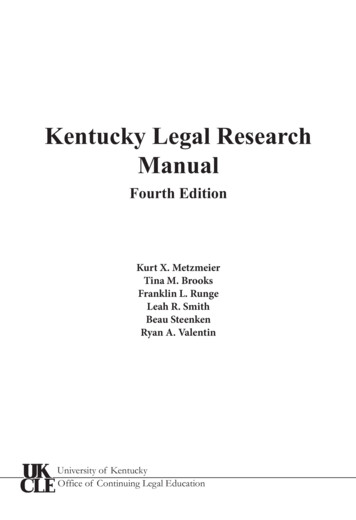
Transcription
Kentucky Legal ResearchManualFourth EditionKurt X. MetzmeierTina M. BrooksFranklin L. RungeLeah R. SmithBeau SteenkenRyan A. ValentinUniversity of KentuckyOffice of Continuing Legal Educationi
USE OF THIS VOLUMESeminars and publications of the University of Kentucky College of LawOffice of Continuing Legal Education (UK/CLE) are designed to assist lawyersin maintaining their professional competence. The Office of Continuing LegalEducation and its volunteer authors and speakers are not, by their participation inthis publication, giving legal advice concerning any specific legal issue or problem,and their professional opinion with regard to legal or practical aspects of handlinga specific issue or problem may change depending on the specific circumstancespresented. Attorneys and others using information from UK/CLE publicationsor seminars must also fully research original and current sources of authorityto properly serve their clients’ legal interests. The forms and sample documentscontained in continuing legal education publications are intended for use only inconjunction with the professional services and advice of licensed attorneys. Thelegal research discussed herein is believed to be accurate, but is not warranted to beso. These materials may contain expressions of opinion which do not necessarilyreflect the views of the Office of Continuing Legal Education, the University ofKentucky, the Commonwealth of Kentucky, or other governmental authorities.Copyright 2016 by the University of Kentucky College of LawOffice of Continuing Legal EducationAll rights reserved.This Handbook may be cited asKentucky Legal Research Manual, 4th ed. § (UK/CLE) (2016).Printed in the United States of America.ISBN 978-1-58757-188-9ii
ABOUT .The University of Kentucky College of Law, Office of Continuing LegalEducation (UK/CLE) was organized in 1973 as the first permanently staffed, fulltime continuing legal education program in the Commonwealth of Kentucky. Itendures with the threefold purpose: 1) to assist lawyers in keeping abreast ofchanges in the law; 2) to develop and sustain practical lawyering skills; and 3) tomaintain a high degree of professionalism in the practice of law. Revenues fromseminar registrations and publication sales allow the Office to operate as a separately budgeted, self-supporting program of the College. No tax dollars or publicfunds are used in the operation of UK/CLE.SeminarsUK/CLE provides a variety of convenient, practical seminars to satisfythe continuing legal education needs of lawyers. Seminars range from half-dayprograms in selected areas to in-depth programs extending over several days. Whilemost seminars are conducted at the College of Law in Lexington, UK/CLE has along-standing statewide commitment. Since its first year of operation, beginningwith a criminal law seminar in Madisonville, Kentucky, the Office has continuedto bring high-quality continuing legal education to attorneys in every region ofKentucky.PublicationsEach seminar is accompanied by extensive speaker-prepared coursematerials. These bound course materials are offered for sale following seminarsand are consistently regarded as valuable, affordable references for lawyers. Since1987, UK/CLE has produced a series of Practice Handbooks and Monographs.Each Practice Handbook is an extensively referenced, fully indexed practice guideconsisting of separately authored chapters, allowing for the comprehensive coverageof a distinct body of law. Each Monograph is a concisely written practice guide,often prepared by a single author, designed to cover a topic of narrower scopethan the Handbooks. They are convenient references on topics often not treatedelsewhere. In 1995, UK/CLE began publication of its highly popular CompendiumSeries. Each Compendium volume gathers several hundred pages of forms, charts,statistical data, case summaries or other reference material useful in all aspectsof drafting, case evaluation, case management, and litigation. In 2008, UK/CLEbegan the task of converting its full publications catalog into a searchable, interactive electronic CD format.iii
MultimediaUnder SCR 3.663, allowing attorneys to receive up to six hours of continuing legal education credit through the use of accredited technology products,UK/CLE has been offering an array of accredited “self-study” audio programs since2002. These accredited technology CLE products are offered in Audio CD, videoDVD, as well as on-demand streaming audio and video formats.Professional ManagementUK/CLE serves the needs of the bar from its offices on the University ofKentucky campus in Lexington. Its staff manages course registrations, publication planning and editing, publication sales, seminar and publication marketing,publication composition and printing, and seminar content planning, as well asbudgeting, accounting and financial reporting. As an “income based” program,UK/CLE’s seminar tuitions and publication sales are budgeted to generate sufficientrevenues for self support.Commitment to Quality and CreativityUK/CLE is a member of the Association for Continuing Legal Education(ACLEA). As such, UK/CLE subscribes to the ACLEA Standards in Continuing Legal Education and the Standards of Fair Conduct and Voluntary Cooperation, administered under the auspices of the American Law Institute-American Bar AssociationCommittee on Continuing Professional Education. Throughout its existence UK/CLEhas been actively involved in the activities and services provided by ACLEA.UK/CLE’s association with national and international CLE professionals has afforded it the opportunity to continually reassess instructional methods, quality inpublications, and effective means of delivering CLE services at consistently highlevels of creativity and quality.An Integral Part of the Legal Profession’sTradition of ServiceAn enormous debt is owed to the judges, law professors, and practitionerswho generously donate their time and talent to continuing legal education. Theirknowledge and experience are the fundamental ingredients for our seminars andpublications. Without their motivation and freely given assistance in dedication toa distinguished profession, high quality continuing legal education would not exist.As a non-profit organization, UK/CLE relies upon the traditional spirit ofservice to the profession that attorneys have so long demonstrated. We are constantlystriving to increase attorney involvement in the continuing education process. Ifyou would like to participate as a volunteer speaker or writer, please contact usand indicate your areas of interest and experience.iv
UNIVERSITY OF KENTUCKYCOLLEGE OF LAWOFFICE OF CONTINUING LEGAL EDUCATIONRoom 20 Law BuildingLexington, Kentucky 40506-0048Phone (859) 257-2921Fax (859) 323-9790http://www.ukcle.comPRESIDENT, UNIVERSITY OF KENTUCKYEli CapiloutoDEAN, COLLEGE OF LAWDavid A. BrennenDIRECTOR OF CLEKevin P. BucknamASSISTANT DIRECTOR OF CLETracy J. TaylorADMINISTRATIVE/BUSINESS MANAGERTECHNICAL SERVICES MANAGERMelinda RawlingsBenjamin J. DistlerEDITORIAL/MARKETING ASSISTANTElizabeth M. Stewartv
UK/CLE: A SELF-SUPPORTING ENTITYThe University of Kentucky Office of ContinuingLegal Education (UK/CLE) is an income-based officeof the University of Kentucky College of Law. Assuch, it is separately budgeted and financially selfsupporting. UK/CLE operations are similar to notfor-profit organizations, paying all direct expenses,salaries and overhead solely from revenues. Nopublic funds or tax dollars are allocated to its budget.Revenues are obtained from registrant enrollmentfees and the sale of publications. Our sole function isto provide professional development services. In theevent surplus funds become available, they are utilizedto offset deficits or retained in our budget to improvethe quality and variety of services we provide.vi
CONTRIBUTING AUTHORSKURT X. METZMEIER (MANAGING EDITOR) is the Associate Director ofthe Law Library of the University of Louisville Brandeis School of Law, wherehe teaches courses in advanced legal research and legal history. He has a B.A.and M.A. in History from the University of Louisville, a M.S. in library and information science from the University of Kentucky, and a J.D. from University ofLouisville Brandeis School of Law, and has been a member of the Kentucky barsince 1995. Before joining the Brandeis School of Law, Metzmeier served as thecollege technology manager at the University of Kentucky College of Law andhas also held positions as a research historian and archivist. He is the author ofWriting the Legal Record: Law Reporters in Nineteenth-Century Kentucky (University Press of Kentucky, Fall 2016) and has published articles in a number oflaw reviews, library journals, and historical publications. He is an active memberof several legal, library, and historical organizations.TINA M. BROOKS joined the University of Kentucky College of Law LibraryFaculty in July 2011 as the Electronic Services Librarian. She assists faculty, students, and public patrons with reference questions and research and also teachestwo sections of the legal research component of the first year legal research andwriting class. She also manages the law library website and the library’s electronic resources. She holds a B.A. in History and Spanish from the University ofNorthern Iowa, a J.D. from the University of Nebraska College of Law, and anM.S. in Information Studies from the University of Texas School of Information.FRANKLIN L. RUNGE joined the Law Library Faculty at the University ofKentucky College of Law in May 2011 as the Faculty Services Librarian. He promotes and amplifies the research interests of all faculty members and is a memberof the teaching team that instructs first year students in their Legal Research andWriting course. He holds a B.A. in Political Science from Hiram College, a J.D.from Northeastern University School of Law, and a M.L.S. from the School ofLibrary and Information Science at Indiana University.LEAH RUPP SMITH is a Law Clerk for the United States Court of Appeals forthe Fifth Circuit. She has a B.A. in journalism and political science from MiamiUniversity, and a J.D. from University of Louisville Brandeis School of Law, andhas been a member of the Kentucky bar since 2013. Before her current position,Smith practiced labor and employment law at Stoll Keenon Ogden PLLC in Louisville.vii
BEAU STEENKEN joined the Law Library Faculty at the University of Kentucky College of Law in September 2010. As the Instructional Services Librarian,he engaged in a revamp of the Legal Research curriculum as the UK College ofLaw shifted from an adjunct-model to a full-time faculty model of LRW instruction. He teaches two to four sections of 1L Legal Research a year and also coordinates informal research instruction of various sorts. He holds a B.A., a J.D., andan M.S.I.S. from the University of Texas, as well as an M.A. in history from TexasState University and an LL.M. in Public International Law from the Universityof Nottingham.RYAN A. VALENTIN joined the University of Kentucky College of Law LibraryFaculty in January 2008 as the Reference Librarian and served as Head of PublicServices at the University of Kentucky College of Law from January 2011 untilDecember 2015. He was also a member of the teaching team that instructed firstyear students in their Legal Research and Writing course. He holds a B.S from theUniversity of Utah, a J.D. from the University of Oregon, and an M.L.I.S. fromFlorida State University.viii
PREFACEBefore the publication of the first edition of this work, there had long beena need for a comprehensive guide to researching Kentucky law. The only prior attempt was State Law Librarian Wesley Gilmer’s bibliography of Kentucky legalresources, Guide to Kentucky Legal Research, but that short work was last updatedthirty years ago in 1985 – well before the computer and the Internet revolutionizedresearch. From the beginning, the Kentucky Legal Research Manual has soughtto fill that need, covering both the traditional instruments of legal research – casereporters, digests, citators, and statutory codes – as well as online legal researchservices and the Internet. It has been designed to not merely explain the tools oflegal research, but also to describe the history and operation of the institutions ofthe Kentucky legal system that create the state’s law – the courts, the legislature,and the regulatory agencies.The Manual is not, however, a primer on legal research in general, althoughwe have included a bibliography of general legal research manuals as an addendum.Rather, it seeks to assist lawyers and other researchers in tackling those difficulttasks unique to legal research in Kentucky – a state distinguished with an old andcomplex constitution, murky sources of legislative history, and local practices foreverything from the titling of motions to the citation of judicial decisions.With so few publications covering Kentucky legal research, we have triedto include (in tables and appendices) as much detailed information about Kentuckylegal institutions and resources as possible, so that this volume could serve as a“one-stop” reference for basic legal information. The downside to such inclusiveness is that such information becomes quickly dated and, as such, the authors cannotwarrant its currency too far beyond the year of publication.Kurt X. MetzmeierManaging EditorMay, 2016ix
ACKNOWLEDGMENTSProducing a quality publication requires a sequence of distinct activitiesof which conceiving, financing, structuring, writing, editing, typesetting, indexing, and proofreading are only a few. Each activity involves thoughtful work anddedication on the part of many individuals. Their efforts in developing an accurate,well organized book belie the conventional wisdom that producing a publicationof this type is a mere mechanical pursuit.I wish to extend sincere appreciation to the dedicated individuals whoserved as authors for this fourth edition of UK/CLE’s Kentucky Legal ResearchManual. Their development, dedication, and perception of the need for this typeof publication provided the support and efforts necessary to make it a reality.Special thanks must go to the publication’s Managing Editor, Kurt X. Metzmeierof the Brandeis School of Law at the University of Louisville, for his work on thedevelopment of content and format, his work as a chapter author, and for his neverfaltering willingness to aid in our efforts on this project. Finally, special thanks isgiven to the individual authors who researched and updated the comprehensivepractical chapters contained herein: Kurt X. Metzmeier; Tina M. Brooks, FranklinL. Runge, Leah R. Smith, Beau Steenken, and Ryan A. Valentin.Over a period of many months, countless hours were dedicated to theproduction of this publication. Invaluable editorial assistance was provided byElizabeth M. Stewart who dedicated significant time and patience to this task.Her diligence, perseverance, and good humor contributed greatly to the aestheticappearance of this edition.Tracy J. TaylorAssistant Director/Director of PublicationsOffice of Continuing Legal EducationUniversity of Kentucky College of Lawx
TABLE OF CONTENTSChapter 1Kentucky ConstitutionKurt X. MetzmeierChapter 2Kentucky Judicial SystemKurt X. MetzmeierChapter 3Kentucky Statutory AuthorityKurt X. MetzmeierChapter 4Local LegislationBeau SteenkenChapter 5Kentucky Legislative Process, History, and PublicationsRyan A. ValentinChapter 6Kentucky Case Law ResearchFranklin L. RungeChapter 7Administrative Law*Amy Beckham FosterBeau SteenkenChapter 8Legal Ethics ResearchKurt X. MetzmeierChapter 9Kentucky Secondary SourcesFranklin L. RungeChapter 10Kentucky Electronic ResourcesKurt X. MetzmeierChapter 11Citation of Kentucky Legal MaterialsKurt X. MetzmeierLeah R. SmithAddendum ABibliography of General and State-Specific Legal ResearchGuidesTina M. BrooksAddendum BKentucky Public Law Libraries and Libraries with LegalCollectionsRyan A. ValentinIndex*Originally written by Amy Beckham Foster in 2005. Updated in 2016 by Beau Steenken.xi
xii
ABBREVIATIONS COMMONLY USEDIN KENTUCKY LEGAL MATERIALSNOTE: Generally used legal abbreviations not specific to Kentucky have beenomitted. Consult Mary Miles Price, Bieber’s Dictionary of Legal Abbreviations,6th ed. (2009) or The Bluebook: A Uniform System of Citation, 20th ed. (2015) fornon state-specific materials.A.K. Mar.A.K. Marshall’s Reports (8-10 Ky. Reports)A.K. Marsh.A.K. Marshall’s Reports (8-10 Ky. Reports)B. Mon.Ben Monroe (40-57 Ky. Reports)B.M.Ben Monroe (40-57 Ky. Reports)Bibb.Bibb’s Report’s (4-7 Ky. Reports)Brandeis L.J.Brandeis Law JournalBushBush’s Reports (64-77 Ky. Reports)c.Chapter (of Kentucky Acts)CCCivil Code (Carroll’s Kentucky Codes)ch.Chapter (of Kentucky Acts)Com.Commonwealth of KentuckyComm. CommissionCommrs. CommissionersConst. ConstitutionCRRules of Civil ProcedureCt. Cl.Court of ClaimsDanaDana’s Reports (31-39 Ky. Reports)DRDisciplinary Rule (from Ky. Code of ProfessionalResponsibility, 1971-90)Duv.Duvall’s Reports (62-63 Ky. Reports)eff. effectiveex sextraordinary sessionH House BillHard.Hardin’s Reports (3 Ky. Reports)HardinHardin’s Reports (3 Ky. Reports)HCRHouse Concurrent ResolutionHJRHouse Joint ResolutionHR House ResolutionHughesHughes’s Reports (1 Ky. Reports)J. Fam. L.Journal of Family Law (University of Louisville)J.J. Marsh.J. J. Marshall’s Reports (24-30 Ky. Reports)K. L. Rep.Kentucky Law ReporterK.B.A. Kentucky Bar Associationxiii
K.B.B.Kentucky Bench & BarK.B.J.Kentucky State Bar JournalK.L.J.Kentucky Law JournalK.L.R.Kentucky Law Reporter (1880-1908)K.L.S.Kentucky Law SummaryK.R.S.Kentucky Revised StatutesKAR Kentucky Administrative RegulationsKBA Kentucky Bar AssociationKBA EKentucky Bar Associations Ethics OpinionKBA UKentucky Bar Associations UnauthorizedPractice OpinionKen. L. R.Kentucky Law Reporter (1880-1908)Ken. L. Rep.Kentucky Law Reporter (1880-1908)Kentucky L.J.Kentucky Law JournalKLRKentucky Law Reporter (1880-1908)KREKentucky Rules of EvidenceKRPCKentucky Rules of Professional ConductKRSKentucky Revised StatutesKSKentucky Statutes (pre-1942)Ky.Kentucky Supreme Court ReportsKy. Kentucky ReportsKy. ActsKentucky ActsKy. Admin. Regs .Kentucky Administrative RegulationsKy. Admin. Reg.Kentucky Administrative RegisterKy. App. Rptr.Kentucky Appellate ReporterKy. B.J.Kentucky Bar JournalKy. Bench & B.Kentucky Bench & BarKy. Children’s Rts. J.Kentucky Children’s Rights JournallKy. Comment’rKentucky CommentatorKy. Const.Kentucky ConstitutionKy. L. Rep.Kentucky Law ReporterKy. L. Rev.Kentucky Law ReviewKy. L. R.Kentucky Law Reporter (1880-1908)Ky. L. Rptr.Kentucky Law Reporter (1880-1908)Ky. L. Summ.Kentucky Law SummaryKy. L. SummaryKentucky Law SummaryKy. L.J.Kentucky Law JournalKy. Law Rep.Kentucky Law Reporter (1880-1908)Ky. Op.Kentucky Opinions (1864-1886)Ky. Opin.Kentucky Opinions (1864-1886)xiv
Ky. R.Kentucky ReportsKy. R.C.Kentucky Railroad CommissionKy. Rev. Stat.Kentucky Revised StatutesKy. Rev. Stat. Ann.Kentucky Revised Statutes AnnotatedKy. S.B.A.Kentucky State Bar AssociationKy. S.B.J.Kentucky State Bar JournalKy. St. B.J.Kentucky State Bar JournalKy. W.C. Dec.Kentucky Workers’ Compensation Board DecisionsLcrREastern and Western U.S. District Courts Joint LocalRules of Criminal PracticeLitt.Littell’s Reports (11-15 Ky. Reports)Litt. Sel. Cas.Littell’s Select Cases (16 Ky. Reports)Louisville Law.Louisville LawyerLREastern and Western U.S. District Courts Joint LocalRules of Civil PracticeLRCLegislative Research CommissionL.B.R.U.S. Bankruptcy Court Local Rules, Eastern/WesternDistrict of KentuckyMar. (AK)A.K. Marshall’s Reports (8-10 Ky. Reports)Mar. (JJ)J. J. Marshall’s Reports (24-30 Ky. Reports)Met.Metcalfe’s Reports (58-61 Ky. Reports)Mon. (B)Ben Monroe (40-57 Ky. Reports)Mon. (TB)T. B. Monroe’s Reports (17-23 Ky. Reports)N. Ky. St. L. F.Northern Kentucky State Law ForumN. Ky. L. Rev.Northern Kentucky Law ReviewO.L.E.C.Opinions of the Legislative Ethics CommissionOAGOpinions the Attorney GeneralOLECOpinions of the Legislative Ethics CommissionOMDOpen Meetings Decisions of the Kentucky AttorneyGeneralOp. Ky. Att’y Gen.Opinions of the Kentucky Attorney GeneralORDOpen Records Decisions of the Kentucky AttorneyGeneralRCrRules of Criminal ProcedureRS Revised StatutesS Senate BillS.W. South Western ReporterS.W.2dSouth Western Reporter, Second SeriesS.W.3dSouth Western Reporter, Third SeriesSCRRules of the Supreme Court of KentuckySCRSenate Concurrent Resolutionxv
sec.sectionSJRSenate Joint ResolutionSneedSneed’s Reports (2 Ky. Reports)SR Senate ResolutionT.B. Mon.T. B. Monroe’s Reports (17-23 Ky. Reports)U. Louisville J. Fam. L. University of Louisville Journal of Family Lawv. versusxvi
Kentucky Constitution1KENTUCKY CONSTITUTIONKURT X. METZMEIERUniversity of LouisvilleLouis D. Brandeis School of LawLouisville, KentuckyCopyright 2016. UK/CLE. All Rights Reserved.1-1
Kentucky Legal Research1-2
Kentucky ConstitutionI.[1.1]A.B.C.D.E.The Current Constitution.1-5[1.2]Provisions of the Current Constitution.1-5[1.3]Procedures to Revise or Amend theConstitution.1-6[1.4]Publication of the Constitution.1-71.[1.5]Official Annotated Editions.1-72.[1.6]Electronic Editions.1-7[1.7]Methods of Interpreting the KentuckyConstitution.1-7[1.8]Researching the Kentucky Constitution.1-91.[1.9]Guides and Treatises.1-92.[1.10] Using Annotated Codes &Shepard’s to Find Case Law.1-9a.[1.11] Annotated KentuckyRevised Statutes.1-9b.[1.12] Westlaw and Lexis.1-9c.[1.13] Kentucky Digests.1-10d.[1.14] Shepard’s KentuckyCitations.1-103.[1.15] Records and Debates ofConstitutional Conventions. 1-11a.[1.16] General PrinciplesRegarding the Useof the Records andDebates of ConstitutionalConventions. 1-11b.[1.17] Documentary Historyof the 1890 ConstitutionalConvention. 1-11c.[1.18] Documents of Kentucky’sThree Prior Constitutions. 1-11i.[1.19] DocumentaryHistory of the1792 Constitution. 1-11ii.[1.20] DocumentaryHistory of the1799 Constitution.1-12iii.[1.21] DocumentaryHistory of the1849-50ConstitutionalConvention.1-124.[1.22] Documentary History ofAmendments.1-121-3
Kentucky Legal ng Other StateConstitutions with SimilarProvisions.1-13G.Constitutional History of Kentucky.1-14[1.25] Introduction.1-14[1.26] Constitution of 1792.1-15[1.27] Constitution of 1799.1-16[1.28] Constitution of 1850.1-16[1.29] Constitution of 1891.1-17[1.30] Constitutional Revision Assembly,1964-66.1-17[1.31] Notable Amendments.1-17[1.32]A.Appendix.1-21[1.33] Outline of the Kentucky Constitution.1-211-4
Kentucky ConstitutionI.[1.1]The Current ConstitutionA.[1.2]Provisions of the Current ConstitutionCan a national grocery store pay its employees in food?1 Is a railroadcompany required to allow another line’s tracks to intersect with theirs?2 Couldthe annual salary of the director of a county hospital be limited to 7,600?3 Can thegovernor spend funds from the treasury on new programs if the legislature does notpass a budget?4 Answers to all these legal questions can be traced not to the Kentucky statutes, nor to the decisions of Kentucky courts, but to our commonwealth’ssingularly inclusive constitution. They illustrate the importance of including thestate constitution as part of any serious legal research project.The current constitution of the Commonwealth of Kentucky was adoptedin 1891. The document, drafted by a constitutional convention that met throughout1890 and 1891, is wide-ranging, often touching on areas not usually the subjectof state constitutions.5 Because of this, responsible legal researchers should checkrelatively early on in their research whether the subject of their research is governedby a constitutional provision. If a provision does apply, researchers should thenexamine the legislative history of the provision and the judicial cases interpreting it.The constitution begins with a Bill of Rights (§§ 1-26) based loosely onthe federal version but with important variations.6 Following the Bill of Rightsare sections outlining Kentucky’s tripartite government (§§ 27-28), including thelegislative (§§ 29-62), executive (§§ 69-108), and judicial branches (§§ 109-139), aswell as the instruments of local government, the county (§§ 140-144) and municipal(§§ 156-168) governing bodies. Also found in this portion are constitutional provisions governing suffrage and elections (§§ 145-155). Later sections cover revenueand taxation (§§169-182), education (§§ 183-189), corporations (§§ 190-208),123456Section 244 mandates that corporations pay wage-earners in “lawful money.”Section 216 is one of a number of provisions dealing with railroads. The drafters of theconstitution feared railroad monopolies and so mandated the interoperability of tracks.Section 246 sets a maximum limit on the compensation on certain “public officials.” Defining a public official is less clear, but the Attorney General has opined that a hospitalmanager is not covered, OAG 62-56.In Fletcher v. Commonwealth, 2005 WL 1183241 (Ky. 2005), the Kentucky Supreme Courtfound that the state constitution gives the governor no emergency or inherent powers tospend state funds that would override the clear injunction of § 230 that “[n]o money shallbe drawn from the State Treasury, except in pursuance of appropriations made by law.”Many scholars think that the constitution covers too much territory, delving as it doesinto areas such as labor law and railroad regulation, and attribute this to the fact that thedelegates to the constitution convention were distrustful of the legislature and sought to“legislate for all time.” William E. Connelley and E. Merton Coulter, History of Kentucky,II, 1005, 1922; Hambleton Tapp and James C. Klotter, Kentucky: Decades of Discord,1865-1900, Lexington, Ky.: University Press of Kentucky, 1977, pp. 263-266.The Kentucky Bill of Rights is derived largely from earlier Kentucky constitutions, withmany provisions dating back to the 1792 version (itself based on the 1790 Pennsylvaniaconstitution).1-5
Kentucky Legal Researchrailroads and commerce (§§ 209-218), and the state militia (§§ 219-223). A groupof general provisions relating to a range of issues including lotteries (§ 226), oaths(§ 228) state treason (§ 229), sovereign immunity (§ 231), dueling (§§ 239-240),wrongful death (§ 241), and juries (§ 248) follows. The document concludes withprovisions regarding revision of the constitution (§§ 256-263).B.[1.3]Procedures to Revise or Amend the ConstitutionThe Kentucky Constitution can be altered by amendment (§§ 256-257),and by constitutional convention (§§ 258-263). An amendment must be proposedby a three-fifths vote by both houses of the Kentucky General Assembly. It is thenplaced on the ballot in the next general election cycle when members of the Houseof Representatives are elected, where it can be ratified or rejected by the electorate.No more than four amendments can be placed on the ballot at one time.7 As of1999, the legislature had placed 71 amendments on the ballot. The voters accepted38 and rejected 33 amendments.8Calling a constitutional convention is a more difficult proposition. A callfor a constitutional convention must be passed by both houses of the legislature intwo successive sessions of the General Assembly and approved in a referendum bya majority of voters equal to one-fourth of those who voted in the previous generalelections (§ 258). The General Assembly approved convention calls in 1931, 1947,1960, and 1977, but all four calls were rejected by the voters.Amendment and convention are not the only means of amending theconstitution. In Gatewood v. Mathews, 403 S.W.2d 716 (Ky. 1966), Kentucky’shigh court found that § 4 of the Kentucky Bill of Rights gave the people of thestate the “right to alter, reform or abolish their government in such manner as theymay deem proper,” so long as the action was ratified by referendum. The rulingallowed a new constitution drafted by a legislatively created Constitutional Revision Assembly to be placed on the 1966 general election ballot for ratification. Itwas defeated by a wide margin.78The informal custom of the General Assembly is that the House and Senate may each propose two amendments. Each chamber traditionally accepts the other’s amendments. In the2000 General Assembly, the new GOP Senate leadership was successful in limiting eachchamber to one proposal, a move intended to kill a referendum on a deposit on containers.It is unclear how these time-honored legislative courtesies will survive if the two chambers continue to be led by opposing parties. Bruce Schneider, “Senate Leaders Want LessAmendments on Ballot,” AP State and Local Wire, March 22, 2000. The legislature has theoption of drafting
The University of Kentucky College of Law, Office of Continuing Legal Education (UK/CLE) was organized in 1973 as the first permanently staffed, full time continuing legal education program in the Commonwealth of Kentucky. It endures with the threefold purpose: 1) to assist lawyers in keeping abreast of

